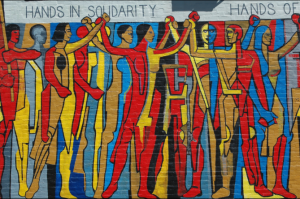One of the issues most talked about in recent years has been the use we make today ICT. In this regard, there are a lot of studies about the communicative and relational purposes for which the network is used, however, often we ignore an issue that is critical to address and which provides the basis for understanding how relationships are configured through such networks. We’re talking about the values that underlie those relations in the network and how values develop more when using ICT. In this context , include youth as social group that makes use of such networks . 
http://www.flickr.com/photos/96447062@N00/152808185
Thus, a study by the University of Barcelona and Teaching Digital Observatory indicates that young people have shown that there is a great interest to be valued by all aspects referring to his relationship with the other, thus confirming the importance of socialization in this age group, where the recognition of otherness is necessary for the construction of autonomy and identity. The authors of the study indicate that there is talk of a construction process of self that goes through the virtual otherness. If for own identity construction we need the existence of the other, not-self, with new technologies this reference otherness dialogue happens through social networks, where the speech is also set with intimate monologues and public dialogues. In this way a new identity is born and new ways of being in the world are used. To Luengo (2013) social networks have become, in record time, in a new world, inaccessible or unaffordable for many adults. A world in which communication formats have undergone remarkable and probably indispensable modes of interaction between people. A world without borders, for good or bad. A world of digital citizens, located in the heart of an area network, sometimes without a net to protect you. But is it new or something that comes from afar? Have we not discussed these issues before? Since such networks has existed everyone has spoken of risks, disadvantages and damages that may result in inappropriate use of the network for the younger, and how attitudes and behaviors that develop in the network will determine social relationships in virtual spaces. But when we talked about this in reality were we not talking about the values that are developed through the network? When we approach relationships in the network, we are actually analyzing the background values that direct the use that young and not so young make of technology, noting which way can follow the moral in this historical moment in which a real technological revolution is developing. It is at this point where we can consider the role of education. Certainly it is not enough to talk and give lectures about the dangers of ICT, how bad they can be. Educators must be able to encourage more young people to acquire the ability to understand, control and self-manage their own behavior in the contexts of virtual interaction (Luengo, 2013). It is necessary to carry out interdisciplinary intervention programs that address different contexts and spaces: family, school, peer group, etc. . because in all of them the individual acts and they can help the individual to develop values to live in society through both classroom and virtual spaces.
References:
-Buxarrais, M.R., Noguera, E., Tey, A., Burguet, M. & Duprat, F. (2011). La influencia de las TIC en la vida cotidiana de las familias y los valores de los adolescentes. http://oed.ub.edu/PDF/OED_informe_TIC_familias_cast.pdf (27/01/14).
-Luengo, J.A. (2013). Promover valores y ética en las relaciones digitales: la necesidad de actuar, cuanto antes. Avances en supervisión educativa. Revista de la Asociación de Inspectores de educación de España, 18, 1-19. http://www.adide.org/revista/images/stories/revista18/ase18_art01.pdf (27/01/14).


Leave a Reply